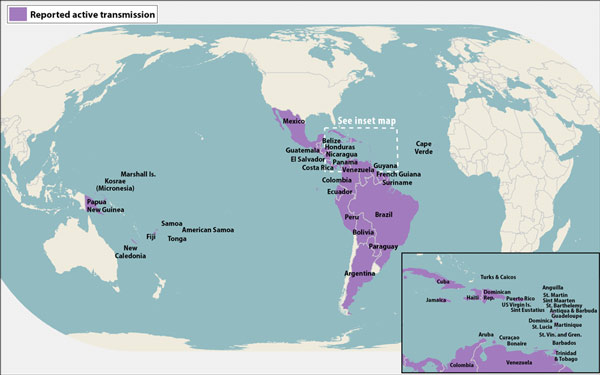DUNIA MAG / Twitter: @duniamagazine

A mosquito control inspector sprays pesticide to kill mosquitos in the Wynwood neighborhood of Miami, where at least 15 people have been infected by Zika virus via mosquitos. Photograph: Joe Raedle/Getty Images
1- Zika primarily spreads through infected mosquitoes. You can also get Zika through sex.
Many areas in the United States have the type of mosquitoes that can spread Zika virus. These mosquitoes are aggressive daytime biters and can also bite at night. Mosquitoes that spread Zika virus also spread dengue and chikungunya viruses.
The Florida Department of Health has identified the spread of Zika by mosquitoes in Wynwood, a neighborhood in Miami, where at least 15 people are said to have been infected. Aerial spraying of insecticides, testing and other intensive control measures have begun in this area. The states of New York and Florida have registered the highest incidences of Zika in the U.S.
Also, Zika can be passed through sex from a person who has Zika to his or her sex partners.
2- The best way to prevent Zika is to prevent mosquito bites.
Use EPA-registered insect repellent.
Wear long-sleeved shirts and long pants.
Stay in places with air conditioning or window and door screens.
Remove standing water around your home.
3- Many people infected with Zika virus won’t have symptoms or will only have mild symptoms lasting for several days to a week. The most common symptoms of Zika are fever, rash, joint pain, conjunctivitis (red eyes), muscle pain, and headache.
People usually don’t get sick enough to go to the hospital, and they very rarely die of Zika. For this reason, many people might not realize they have been infected.
4- Zika is linked to birth defects.
Zika infection during pregnancy can cause a serious birth defect called microcephaly that is a sign of incomplete brain development. Doctors have also found other problems in pregnancies and among fetuses and infants infected with Zika virus before birth. If you are pregnant and have a partner who lives in or has traveled to an area with Zika, do not have sex, or use condoms the right way, every time, during your pregnancy.
5- Pregnant women should not travel to areas with Zika.
If you must travel to one of these areas, talk to your healthcare provider first and strictly follow steps to prevent mosquito bites during your trip.
6- Returning travelers infected with Zika can spread the virus through mosquito bites.
During the first week of infection, Zika virus can be found in a person’s blood and can pass from an infected person to a mosquito through mosquito bites. An infected mosquito can then spread the virus to other people.
Couples with a partner who lives in or has traveled to an area with Zika should take steps to protect during sex.
Information source: Centers For Disease Control and Prevention
Join mailing list for updates and monthly newsletters

